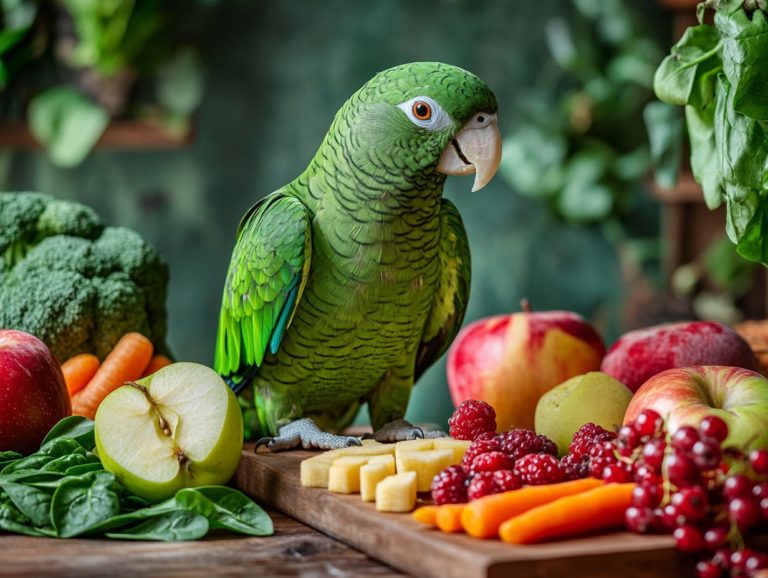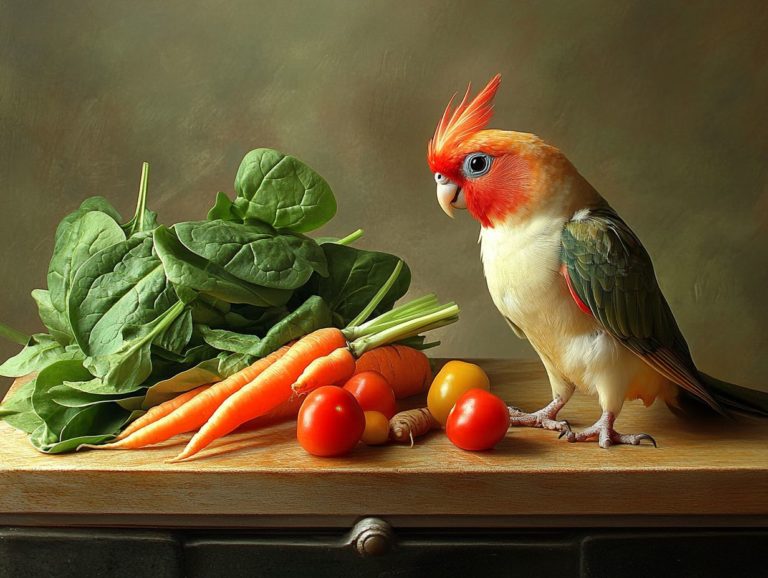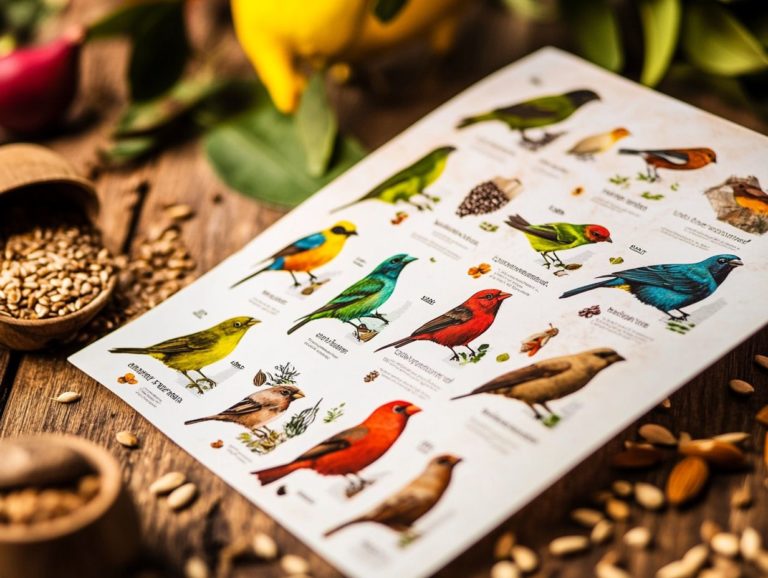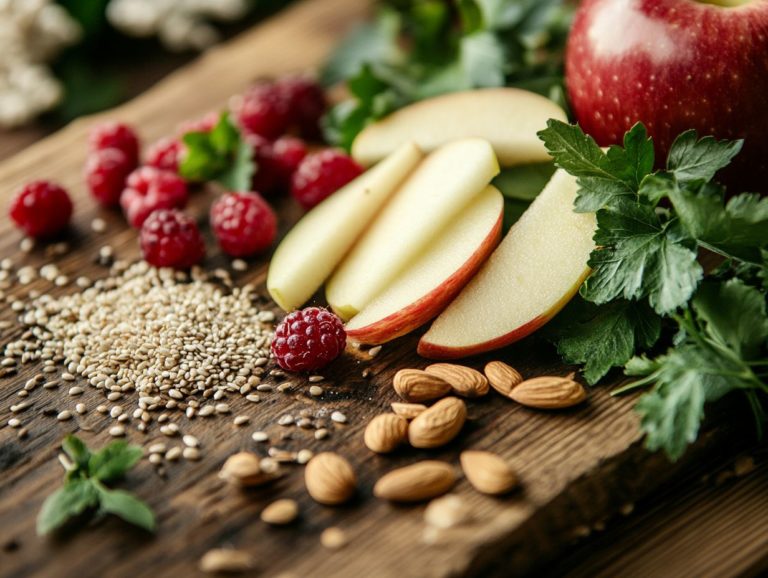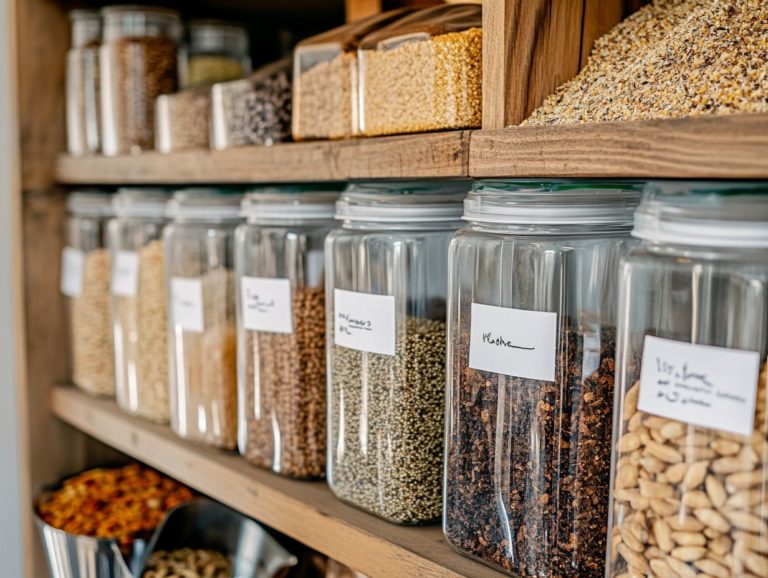Understanding the Role of Fat in Bird Diet
Birds, much like any living beings, require a well-rounded diet to flourish. Fat is a vital component of their nutritional needs.
Let s explore why fat is crucial for your bird’s health! This article examines the significance of fat in a bird’s diet, differentiating between saturated and unsaturated fats while identifying both natural and processed sources. It also looks at the appropriate amount of fat birds should consume, the effects of fat on their health, and offers practical tips for maintaining a healthy fat intake.
Whether you’re a devoted bird enthusiast or a caring pet owner, understanding these concepts is essential your bird s health depends on it!
Contents
Key Takeaways:
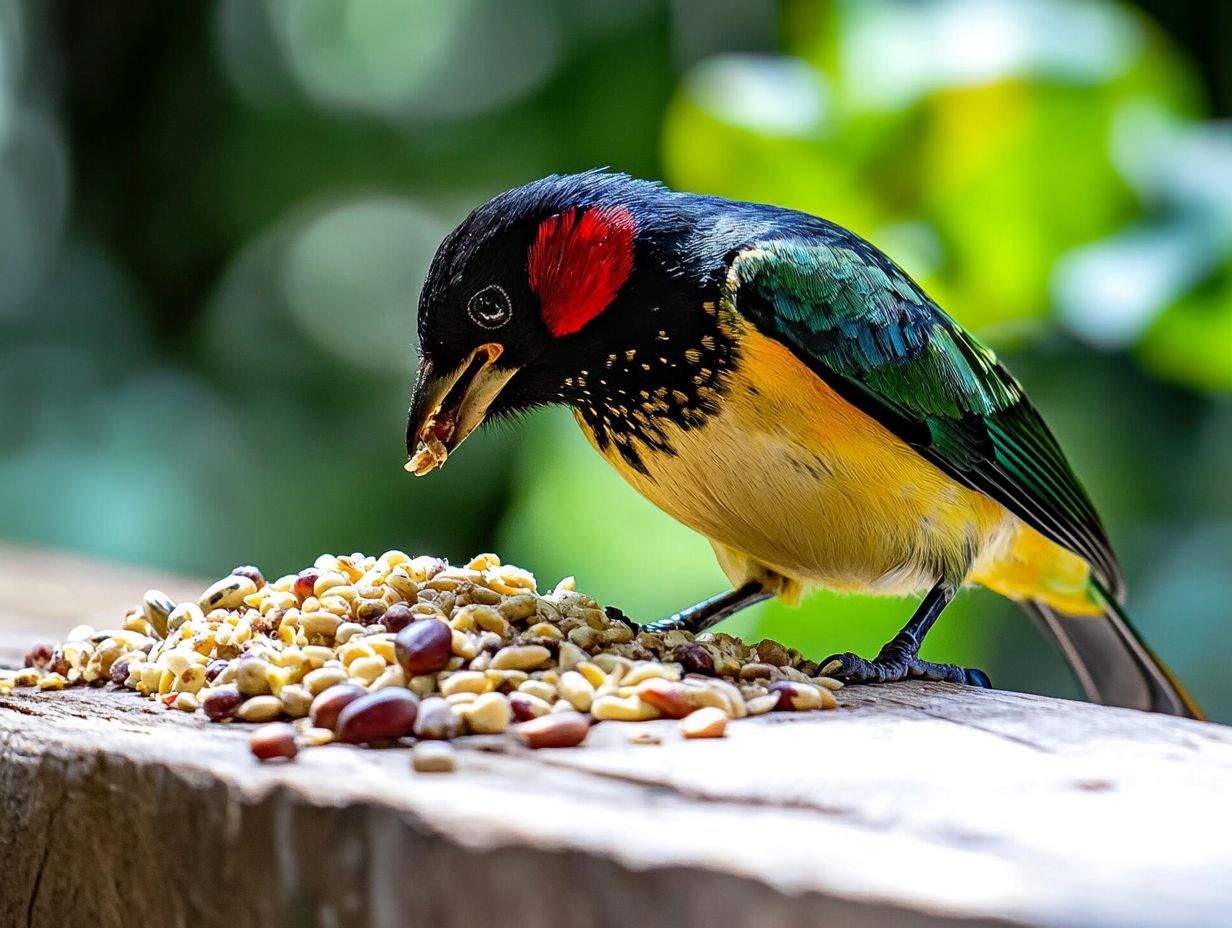
- Fat is a vital component of a bird’s diet, providing essential energy and promoting healthy growth and development.
- Understanding the types of fat in a bird’s diet, such as saturated and unsaturated, helps ensure a balanced and nutritious diet.
- A healthy balance of natural and processed fat sources is important for maintaining a bird’s overall health and well-being.
The Importance of Fat in Bird Diet
The significance of fat in a bird’s diet is paramount, serving as a cornerstone for their overall health and vitality.
Essential fatty acids are important fats that your bird needs for good health, including omega-3 and omega-6. They are integral to many bodily functions ranging from energy production and immune response to cognitive function.
For birds like Budgies, Cockatiels, and larger species such as African Greys and Macaws, specific dietary fats support healthy skin and feathers. They also promote proper digestion and ensure optimal growth during the critical hatching phase.
Why Fat is Essential for Birds
Fat is a critical part of your bird s diet, providing essential fatty acids that are crucial for their overall health.
These fatty acids enhance brain function, supporting the development and maintenance of cognitive abilities. This enables birds to learn, adapt, and interact effectively in their environments. Essential fatty acids strengthen the immune response, helping fend off diseases and promoting overall vitality.
By incorporating these dietary fats, birds can also mitigate the risk of chronic inflammation, which can lead to various health complications. Therefore, ensuring a proper balance of these nutrients is vital for maintaining not just physical wellness but also mental sharpness and longevity in avian species.
Understanding Different Fats in Your Bird’s Diet
Grasping the various types of fat in a bird’s diet is crucial for crafting a balanced feeding strategy that fosters optimal health and well-being.
Both saturated and unsaturated fats serve unique purposes, but unsaturated fats like those found in oils, seeds, and nuts are particularly advantageous for avian health.
By skillfully balancing these fats, you can avert dietary deficiencies and enhance the overall vitality and longevity of your pet birds.
Saturated vs. Unsaturated Fat
Saturated and unsaturated fats differ significantly in their chemical structure and health implications, making it essential for you as a bird owner to grasp this distinction.
Birds, much like us, thrive on a balanced diet that incorporates both types of fats to support their overall health. Saturated fats, commonly found in corn and palm oil, are solid at room temperature. While they can contribute to energy storage, excessive consumption may pose health risks.
On the other hand, unsaturated fats found in olive oil, seeds, and fatty fish are liquid at room temperature and are crucial for enhancing nutrient absorption and promoting heart health.
These beneficial fats can lead to improved feather development and metabolic function in your feathered friends. However, moderation is key; too much of a good thing can lead to obesity and its associated complications. So, it s vital to strike the right balance.
Now that you understand the importance of fat, check your bird’s diet today!
Sources of Fat in Bird Diet
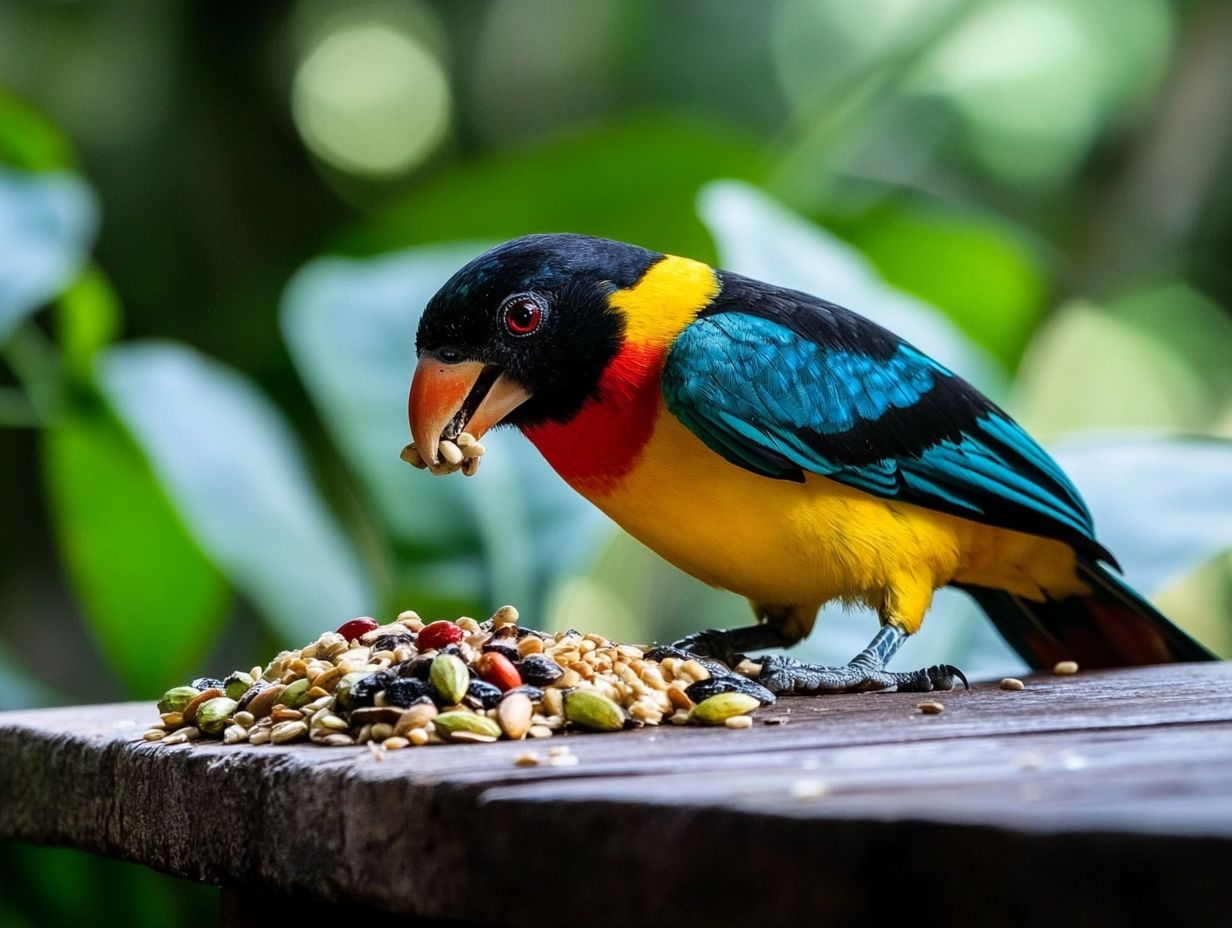
Identifying the sources of fat in a bird’s diet is crucial for creating a balanced diet that fosters avian health and longevity.
Various natural sources, such as high-quality oils, nuts, and seeds, offer essential fatty acids needed for good health. Processed options like certain premium pellets may include added fats, but they require thorough evaluation.
Natural vs. Processed Sources
The distinction between natural and processed sources of fat is essential for bird owners who want to optimize their pet’s diet and health.
Understanding this difference can help you make better choices right away! Natural fat sources like seeds, nuts, and avocados are packed with essential fatty acids and nutrients that support energy levels, feather quality, and overall vitality.
In contrast, processed fats in commercial bird feeds often lack the same nutrients and can introduce unhealthy additives.
As a bird owner, you should prioritize selecting high-quality natural fat sources and incorporate them thoughtfully into your feeding strategies. This approach will help you create balanced diets that cater to your pets’ unique needs while minimizing the risks associated with less nutritious options.
How Much Fat Should Birds Consume?
Determining the right fat intake for birds is essential for their health and longevity. Whether it’s too much or too little, improper fat levels can lead to nutritional deficiencies and various health issues.
Experts recommend a balanced diet that incorporates a specific percentage of fat customized to meet the unique needs of different bird species. By carefully monitoring fat intake, you can help maintain optimal health and prevent concerns associated with chronic inflammation and other diet-related ailments.
Recommended Daily Intake
The recommended daily intake of fat varies among different bird species, each reflecting their unique nutritional needs and health considerations:
- Budgies: 5-10%
- Cockatiels: 10-15%
- African Greys: 10-12%
- Macaws: 15-20%
These tailored fat intake recommendations play a crucial role in promoting not just physical health but also longevity and vitality across different species.
Impacts of Fat on Bird Health
Fat plays a big role in your bird’s health! It affects numerous facets of their well-being, from chronic inflammation to cardiovascular disease. While healthy fats can positively influence a bird’s vitality, poor fat selections can usher in a host of health issues, including obesity, subpar feather quality, and a weakened immune response.
Grasping these effects is crucial for bird owners, enabling them to make informed dietary decisions that promote their pets’ health and longevity.
Positive and Negative Effects
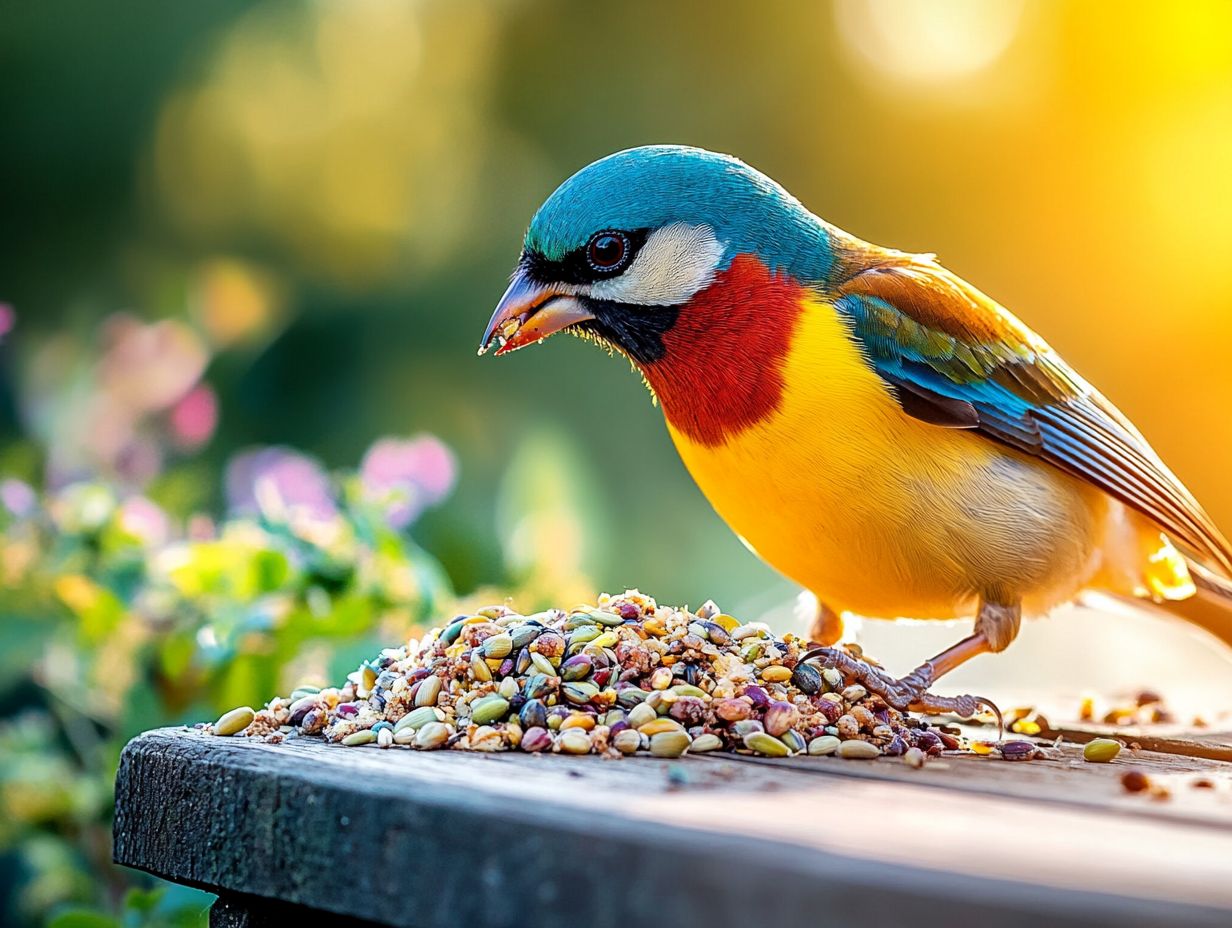
Dietary fats play a crucial role in bird health. It’s essential to grasp their impact on your feeding practices.
When you choose healthy fats wisely, they can significantly enhance your bird’s skin and feather quality. This gives them a vibrant appearance and helps mitigate issues like feather plucking.
Conversely, if you opt for excessive or low-quality fats, you risk inviting obesity and health problems related to metabolism into their lives. This can adversely affect their physical health and lead to behavioral issues such as lethargy or aggression.
The connection between nutrition and overall well-being underscores the importance of a balanced approach to fats.
By maintaining this balance, you not only support your bird’s physical health but also promote their mental stability. This results in happier and more active companions.
Balancing Fat in a Bird’s Diet
Balancing fat in a bird’s diet is essential for their health and longevity. It helps prevent nutritional deficiencies and long-term health problems.
To achieve the right fat balance, it s important to understand the specific dietary needs of various bird species. Incorporate healthy sources of fat in moderation.
With effective feeding strategies, you can enhance your birds’ well-being. This will improve their quality of life and overall vitality.
Tips for Maintaining a Healthy Fat Intake
To maintain a healthy fat intake for your birds, consider their unique needs. Use strategic feeding practices tailored to each species.
As a bird owner, include various healthy fat sources in your pets’ diets. Flaxseed, sunflower seeds, and walnuts are great options.
These tasty treats are packed with essential fatty acids that boost your birds’ health and appearance. Manage portion sizes wisely to keep your birds healthy and thriving!
Introduce a mix of fresh fruits, leafy greens, and vegetables to increase diet variety. This ensures your birds receive a well-rounded intake of essential nutrients while indulging in a delicious meal experience.
Frequently Asked Questions
What is the role of fat in a bird’s diet?
Fat plays an important role in providing birds with energy, insulation, and storage for leaner times.
Why do birds need fat in their diet?
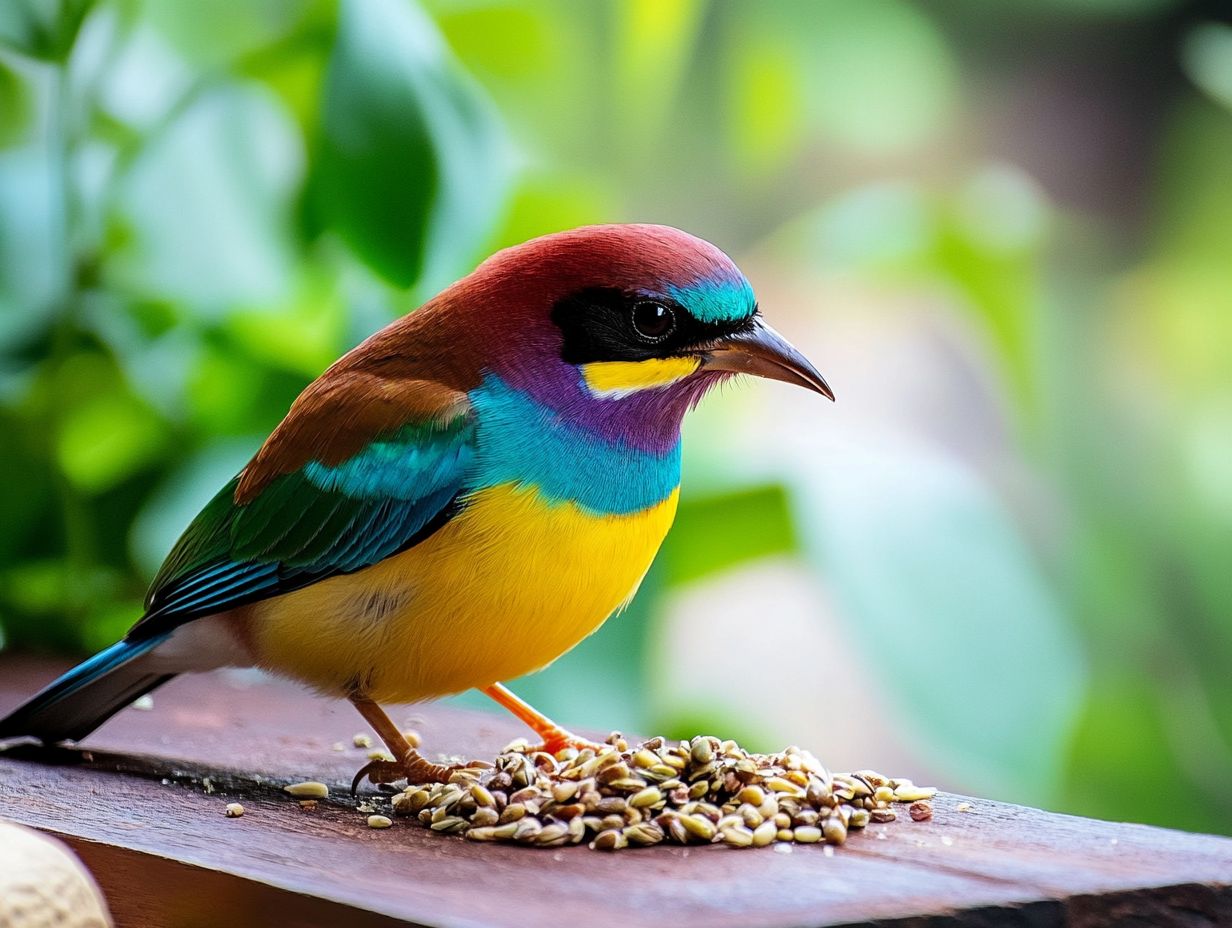
Birds have high-energy needs due to their small size and high metabolism. Fat provides a concentrated source of energy to meet these needs.
How does fat help birds stay warm?
Fat acts as insulation for birds, keeping them warm in colder temperatures by trapping heat underneath their feathers.
Do all birds need the same amount of fat in their diet?
No, the amount of fat needed in a bird’s diet varies depending on their species, size, and activity level. Some birds, like migratory birds, may require higher levels of fat to fuel their long journeys.
What tasty foods can help my birds get enough fat?
Nuts, seeds, suet, and insects are all high in fat and commonly found in bird diets. Some birds also consume fruits or nectar, which can have high levels of fat.
Is too much fat in a bird’s diet harmful?
Yes, just like humans, birds can suffer from health issues if they consume too much fat. Provide a balanced and varied diet to ensure your bird’s overall well-being.
Ready to improve your bird s diet? Start today by introducing these healthy fats!

